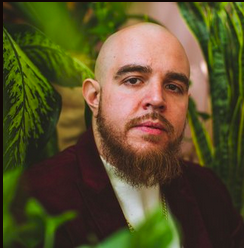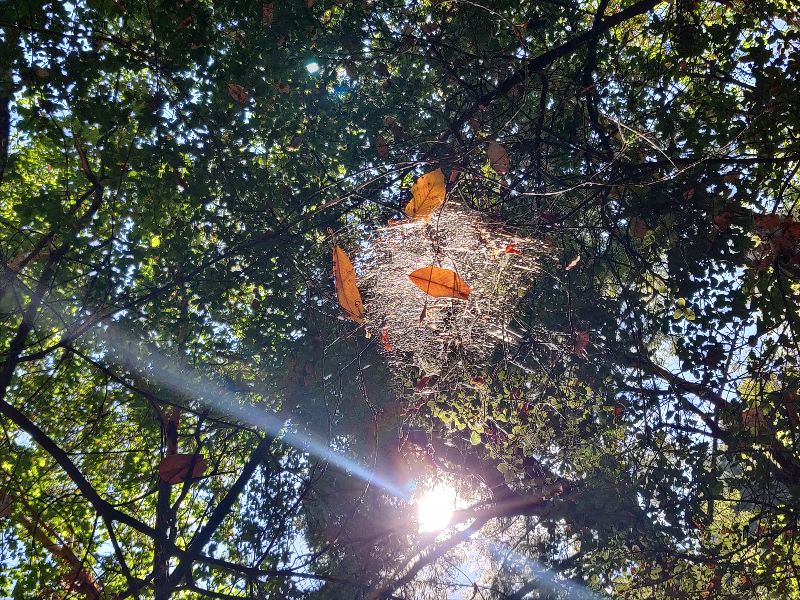The following is part of an ongoing dialogue with the feelings and questions of our time. This month, our teacher Kai Siedenburg explores the potent possibilities when we engage with nature and the more-than-human as beloved kin.
“In Native American culture, we see everything as being alive. Each living thing has a specific role as a teacher and family member. Everything on Earth, whether stone, tree, creature, cloud, sun, moon, or human being, is one of our relatives.” — Jamie Sams
 Imagine how different our lives and our world might be if we saw everything on Earth as a relative and teacher. We would know in our bones that we are never alone, but rather part of a vast web of life, with plenty of allies available to guide us. We would have a solid base of support we could count on in good times and bad, perhaps more than some of our human kin. We would be inspired to treat our more-than-human relations with greater care and respect, to walk more gently on the Earth, and to protect what we love.
Imagine how different our lives and our world might be if we saw everything on Earth as a relative and teacher. We would know in our bones that we are never alone, but rather part of a vast web of life, with plenty of allies available to guide us. We would have a solid base of support we could count on in good times and bad, perhaps more than some of our human kin. We would be inspired to treat our more-than-human relations with greater care and respect, to walk more gently on the Earth, and to protect what we love.
Nature can be viewed as a diverse and loving extended family that is  always available to support us. It encourages our interests, draws out our gifts, and teaches us about what matters and how to be a responsible member of the community—like a healthy human family would. As Indigenous people have known for millennia, all aspects of nature have wisdom and medicine to share, and respectful contact with them allows us to access that medicine. If we are willing to listen, the natural world can speak to us very deeply.
always available to support us. It encourages our interests, draws out our gifts, and teaches us about what matters and how to be a responsible member of the community—like a healthy human family would. As Indigenous people have known for millennia, all aspects of nature have wisdom and medicine to share, and respectful contact with them allows us to access that medicine. If we are willing to listen, the natural world can speak to us very deeply.
 It’s healthy for us to experience profound love for nature and close friendships with more-than-human beings. Time and again in my work with students and clients, I have seen how approaching nature beings as friends, relations, and teachers is healing for us and for the Earth. Every moment of loving and respectful connection makes a difference.
It’s healthy for us to experience profound love for nature and close friendships with more-than-human beings. Time and again in my work with students and clients, I have seen how approaching nature beings as friends, relations, and teachers is healing for us and for the Earth. Every moment of loving and respectful connection makes a difference.
Of course, a friendship with a fern, a bluebird, or the ocean will be quite different from one with another human. You may need to go to them and meet on their terms. The connections will likely be less verbal and more visceral, embodied, and instinctual. Much of the communication will transpire at a level deeper than words.
different from one with another human. You may need to go to them and meet on their terms. The connections will likely be less verbal and more visceral, embodied, and instinctual. Much of the communication will transpire at a level deeper than words.
Still, making friends with “other” beings and natural places is easier than you may think. It starts with knowing it’s possible and giving it a chance. Here are a few tips to guide you…
 Notice the beings and places you are instinctively drawn to and give yourself opportunities to connect with them, preferably one on one. Check in to see if you have permission to approach, and get to know them through your senses. Find ways to communicate—you might want to speak out loud, write a letter to or a dialogue with them, or practice being quiet inside and out and allowing nature to speak to you. Keep in touch and tend the connection—make dates to get together, be curious about them, show them that you care. A little time and attention can go a long way, especially when you are present and your heart is open. You may be surprised by the depth of love and friendship that can blossom.
Notice the beings and places you are instinctively drawn to and give yourself opportunities to connect with them, preferably one on one. Check in to see if you have permission to approach, and get to know them through your senses. Find ways to communicate—you might want to speak out loud, write a letter to or a dialogue with them, or practice being quiet inside and out and allowing nature to speak to you. Keep in touch and tend the connection—make dates to get together, be curious about them, show them that you care. A little time and attention can go a long way, especially when you are present and your heart is open. You may be surprised by the depth of love and friendship that can blossom.
Nourishing our innate love for nature inspires us to treat the Earth, her  creatures, and each other with kindness and respect, and is a surprisingly important key to restoring peace and balance in our lives and in the world. It’s one of the most powerful things we can do for ourselves and our planet.
creatures, and each other with kindness and respect, and is a surprisingly important key to restoring peace and balance in our lives and in the world. It’s one of the most powerful things we can do for ourselves and our planet.
Sending reverence and respect for the wild world in and around us!
Kai, Ariana, and the Earthbody Team
This text is adapted from Kai’s third book, Love Poems from the Earth. To learn more about finding love and friendship in the natural world, read the introduction to the book here.
NATURE PRACTICE

Use Your Words
By Kai Siedenburg
Try speaking a few words to more-than-human beings and see what you notice. “Hello,” “thank you,” and “I love you” are great places to start. Or feel free to have a longer dialogue through speaking or writing, or to step into the roots or paws of another being and speak in their voice. This can be a powerful way to receive wisdom and medicine from the natural world.
PROFESSIONAL RESOURCES
 We are the Great Turning Podcast welcomes you to the kitchen table of the legendary eco-spiritual teacher Joanna Macy, where she dives into what it takes to live with our hearts and integrity intact in this time of global crisis. You’ll be guided into these conversations by Jess Serrante, a longtime activist and student of Joanna’s. Together, with Joanna and Jess, we’ll discover abiding wisdom that can help us stay joyful and energized as we work toward a more just and life-sustaining world.
We are the Great Turning Podcast welcomes you to the kitchen table of the legendary eco-spiritual teacher Joanna Macy, where she dives into what it takes to live with our hearts and integrity intact in this time of global crisis. You’ll be guided into these conversations by Jess Serrante, a longtime activist and student of Joanna’s. Together, with Joanna and Jess, we’ll discover abiding wisdom that can help us stay joyful and energized as we work toward a more just and life-sustaining world.
HOPEFUL ACTIVISM
 USDA Will Compensate Black Farmers for Discrimination “The United States Department of Agriculture will pay a historic $2.2 billion to Black farmers as compensation for decades of discrimination in lending. The National Black Farmers Association helped secure the compensation after years of lawsuits and other actions. Approximately 43,000 Black farmers are expected to receive settlements, some of up to half a million dollars each.” Watch an interview here!
USDA Will Compensate Black Farmers for Discrimination “The United States Department of Agriculture will pay a historic $2.2 billion to Black farmers as compensation for decades of discrimination in lending. The National Black Farmers Association helped secure the compensation after years of lawsuits and other actions. Approximately 43,000 Black farmers are expected to receive settlements, some of up to half a million dollars each.” Watch an interview here!
 Nurturing Seeds of Freedom in Palestine “The Om Sleiman farm in the village of Bil’in is part of a growing agroecology movement in the occupied West Bank that is turning to sustainable farming as a way to resist the Israeli occupation and stay rooted to the land…For members of Om Sleiman, growing food in defiance of the encroaching wall and settlements is a way of continuing the struggle for freedom.” Read more here!
Nurturing Seeds of Freedom in Palestine “The Om Sleiman farm in the village of Bil’in is part of a growing agroecology movement in the occupied West Bank that is turning to sustainable farming as a way to resist the Israeli occupation and stay rooted to the land…For members of Om Sleiman, growing food in defiance of the encroaching wall and settlements is a way of continuing the struggle for freedom.” Read more here!
POETRY AND INSPIRATION
This month we honor and recognize Hispanic Heritage Month, featuring nature-based poems from two inspiring Mexican-American poets.

in a dream, an ancestor and i become one with the Earth
By Vic Xochitl Chavez
before greed “owned” our mountains and valleys, she said
our people raised calabazas
Sunflowers
cempasuchiles
and we all grew in companionship
she said these are my relatives
she told me the soil would recognize my petals
the Earth would still welcome us home
and so we frolic along the bosom of our mountains
our feet root into the dirt
our bodies sprout from the gourds
we are once again children of the pumpkin
i bloom and scatter
Exerpted from a De Los article,
How does nature inspire us? These Latino poets dig deep in their roots
Vic Xochitl Chavez is a queer Mexican American poet. They hold a bachelor’s in creative writing from Columbia College Chicago, where they were an assistant editor for both Columbia Poetry Review and Hair Trigger. Their poetry has been published in South Side Weekly, “Breakbeat Poets Vol. 4: LatiNEXT” and in Columbia College’s Poetry Review and Allium Journal. They are a poetry editor at Mulberry Literary and were published in the magazine prior to taking up an editorial role. Find their bio at Mulberry Literary

if humans have different dialects then maybe plants do too
By José Olivarez
whatever (warnings) (advice) (sweet nothings)
the violets give me get lost.
in translation, i keep the meaning
but lose all texture. all the honey.
all the smoke of life rises
to eye level. i bow down to the dirt.
some words keep the sweetness
of their names: honey. luz. cielo.
dirt. we’ve put enough family members
into the dirt, they must be whispering all around me.
my homies who don’t read poems
want to know why i can’t just say it simply.
i am saying it, i want to tell them. i am saying everything.
Exerpted from a De Los article,
How does nature inspire us? These Latino poets dig deep in their roots
José Olivarez is the son of Mexican immigrants and the author of two collections of poems, including “Promises of Gold,” which was longlisted for the 2023 National Book Awards. His debut book of poems, “Citizen Illegal,” was a finalist for the PEN/Jean Stein Book Award and a winner of the 2018 Chicago Review of Books Poetry Prize. Along with Felicia Rose Chavez and Willie Perdomo, he co-edited the poetry anthology “The BreakBeat Poets Vol. 4: LatiNEXT.” Find more info on his website.
Thank you for reading! We welcome your comments and questions. Contact EBI: earthbodyinstitute@gmail.com.
We acknowledge that The Earthbody Institute is located in Huchiun, in unceded Lisjan territory, now known as Oakland. We honor and support the ancestors and present Lisjan people. We encourage you to learn more and make a donation to support the return of their land and culture.

